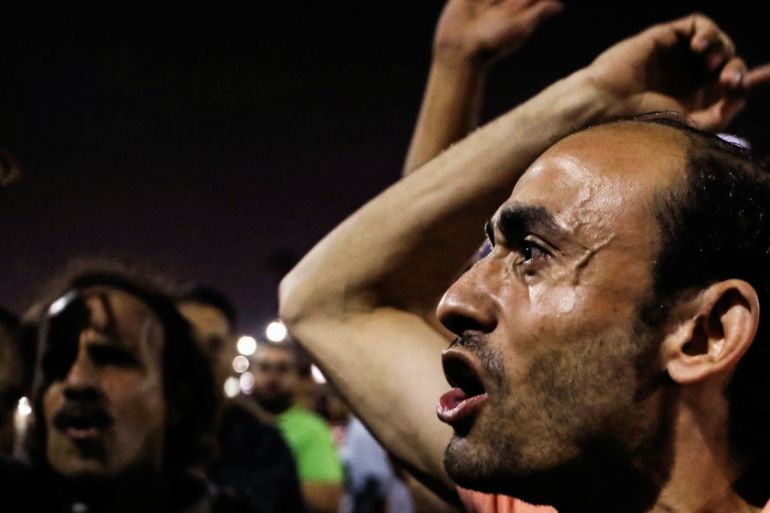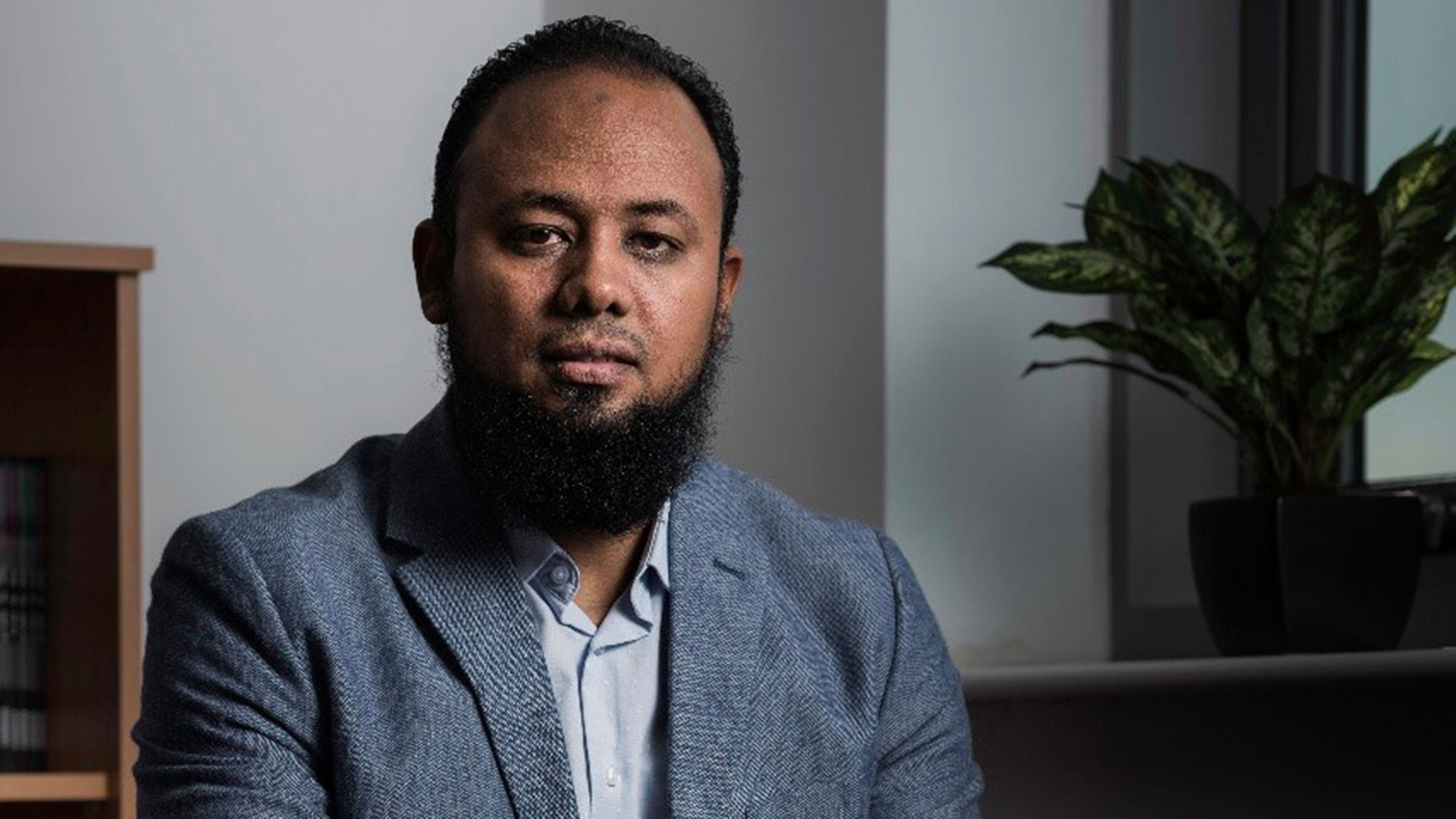Egypt: Targeting the final line of defence
The government of President Abdel Fattah el-Sisi is accused of cracking down on lawyers and human rights defenders.

“Every day, I go to work and wonder if I’ll return,” explained Khaled*, an Egyptian lawyer, formerly at a human rights organisation that provided legal support for students and other young people.
More than 2,300 people were arrested following a series of anti-government protests in September and now the government of Egyptian President Abdel Fattah el-Sisi is cracking down on those who would defend them.
Keep reading
list of 4 itemsPalestinian Prisoner’s Day: How many are still in Israeli detention?
‘Mama we’re dying’: Only able to hear her kids in Gaza in their final days
Europe pledges to boost aid to Sudan on unwelcome war anniversary
At least 16 lawyers have been arrested since protests began, including four who were taken while representing their clients in court. Amnesty International has decried the “vast scale and arbitrary nature” of the arrests.
“Khairy al-Sayed Khairy was taken from his home. Mohamed Metwaly was taken while in court. Nowhere is safe,” said Khaled, naming colleagues of his that have fallen victim to the latest crackdown on human rights lawyers.
For Khaled, the fear is very real. In February, he was surrounded by plain-clothed police officers as he left court after attending a hearing with his client. He says he was beaten and threatened with torture.
“For two days, no one knew where I was,” said the lawyer, who is in his late twenties.
He spent six months in the Second Zagazig Police Station before being released. But the case against him continues. Charged with belonging to a banned group, possession of pamphlets, dissemination of false information and funding a banned group, Khaled says officers tried to force a confession out of him with threats of torture.

One of those who supported Khaled during his imprisonment was Mohamed el-Baqer, a human rights lawyer and director of the Adalah Center for Rights and Freedoms, a human rights organisation that offers legal support.
On September 29, el-Baqer was arrested while representing the prominent Egyptian blogger and rights activist Alaa Abdelfattah. He was charged with belonging to a banned group, dissemination of false information, receiving foreign funding and misusing social media. He was transferred to Egypt’s notorious Tora maximum-security prison, known as the Scorpion 2 Prison, where he remains.
“It’s terrifying, but I need to be there with him. El-Baqer stuck by me while I was in detention, and no matter how hard and scary it is now, I have to be with him,” Khaled reflected, as he prepared to attend El-Baqer’s hearing. “He was always a reassuring presence in my life, and his detention has hit me the hardest.”
After el-Baqer’s arrest, Adalah was closed in an attempt to protect the other lawyers working there. A source, who asked not to be named for fear of reprisal, told Al Jazeera it was likely that el-Baqer was targeted because Adalah recently filed a joint submission with the International Commission of Jurists (ICJ) to the Human Rights Council’s Working Group ahead of its review of Egypt’s human rights record. The joint report highlighted the use of arbitrary arrests and detentions, torture and enforced disappearances, the death penalty following unfair trials and the politicisation of the judiciary.

Among the other prominent lawyers to have been arrested in the last wave of arrests are Amr Imam, from the Arabic Network for Human Rights Information (ANHRI), a non-governmental organisation, and award-winning human rights lawyer Mahienour el-Massry.
El-Massry was arrested as she left the state security prosecutor’s headquarters on September 22 after attending judicial investigations into the cases of arrested protesters.
Imam was taken from his home in Cairo in the early hours of October 16.
“I was still at court when I heard Mahienour was taken. My colleague came running in, he had seen her being taken away and he ran to tell us. At that moment, I was terrified. I’d only been out 40 days, and the idea of going back … ” Khaled’s voice tapered off as he spoke.
There are an estimated 60,000 political prisoners in Egypt, with the most common charges being belonging to a banned organisation and spreading false information. Hundreds of thousands have been imprisoned under the protest law, which bans public gatherings of 10 or more people without the authorisation of the country’s interior ministry.
“I have defendants accused of protesting, when they were arrested during days there were no protests. I have a girl and her mother who were arrested while they were waiting at a tram station,” said Khaled.
Over the past six years, an estimated 18 new prisons have been built in Egypt.
Human Rights Watch has said that the widespread and systematic use of torture, including beatings, electric shocks and rape, within them may amount to a “crime against humanity”.
“It’s a terrifying thought, going down to court every day in fear of being arrested – all while knowing exactly what kind of hell you’ll be sent into,” said Khaled, adding that conditions have gotten “significantly worse” recently.
Following a court hearing where el-Baqer’s detention was renewed, Khaled explained: “El-Baqer represented himself and didn’t leave us [lawyers] much to say. But the reports of his abuse, physical and verbal, are hard to hear. He was forced to walk with his back bent, while insults were hurled at him by officers. He was stripped of all his belongings, and he was refused a shower or change of clothes for days. The prison administration has even refused his request to see the prison doctor.”
Amnesty International has described the allegations that Alaa Abdel Fattah and el-Baqer have been tortured as a “chilling illustration ” of the Egyptian authorities’ ruthless tactics in silencing critics.
“The abuse that the Egyptian authorities are subjecting Mohamed el-Baqer to just because he bravely defends the rights of victims of human rights violations is another illustration of Egypt’s utter disregard for human rights,” said Najia Bounaim, North Africa Campaigns Director at Amnesty International, on the organisation’s website.
“Both men appear to have been targeted solely based on their legitimate work defending human rights, they should not even be behind bars let alone facing torture and other ill-treatment.”
In this climate of fear, some legal offices have shut down, while others are left wondering how much longer they can remain operating for.
But Khaled says the dangers will not deter him.
“Yes, I’m terrified, but what else can I do?” he asked. “If I don’t attend [court] with the people, who will?”
*Note: Name changed for security reasons.